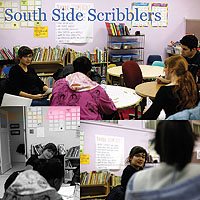South Side Scribblers give displaced women in Englewood opportunity for self-expression
By Deva Woodlydeva@uchicago.edu
News Office
 Photos by Beth Rooney |
|
At Maria Shelter, a temporary safe place for displaced women in times of crisis in Chicago’s Englewood neighborhood, many of the residents find the practical endeavors of finding work and housing consumes their time. But since last spring, a group of University students, who comprise the South Side Scribblers, have been encouraging the women to take some time to create.
Thalia Gigerenzer, a fourth-year in the College and co-director of the Scribblers, described the goal of the program at Maria Shelter: “We try to foster an environment where the women can step back from the practical worries that they have to deal with every day and take time to reflect and create.”
Though the South Side Scribblers have been conducting writing seminars for children in area schools since 1994, the program at Maria Shelter is the first writing workshop for adults that the college students have put together. So far, it’s been successful.
One of the women explained her participation this way: “I’m a word person. I’ve always been a word person. I try to think about life and the way words fit circumstances, and that’s what we do in this group.”
Each week, the workshops begin the same way—the college student facilitators select writings they think will interest the group, the group reads and discusses the writings together, and then everyone writes an extemporaneous piece on a theme that emerges from discussion.
“This is not like going into elementary school classrooms. We are not here to ‘teach’ these women anything,” said co-director Jacob Cogan. “Many of the people who come through Maria Shelter are lifelong writers.”
“In designing the workshop,” Gigerenzer explained, “we knew that we just wanted to create an outlet, a safe environment where we could all share our thoughts.”
In order to achieve that goal, the group adopted a strict rule: Everyone participates in the reading, discussion and writing, including the student facilitators. This approach results in a seminar setting in which everyone learns from each other.
In this way, the South Side Scribblers are able to leverage some of the resources they have as University students to create opportunities for reflection and self-expression these women might not otherwise have at their fingertips. For example, due to a grant from the University of Chicago Women’s Board, the Scribblers are able to purchase books for their programs free from the 57th Street Seminary Co-op Bookstore.
Although workshops are held weekly, the group experiences a lot of turnover because women can move in and out of the shelter quickly. Still, the students and participants find they are able to form meaningful connections. Alex Spacht, a first-year in the College and seminar leader, said, “I learn a lot every week. These women have much more life experience than I have, and maybe more than I’ll ever have, but we are able to relate to each other through these common themes: childhood, food, the historic time we’re living through. It is an interesting, challenging dynamic, but it works well.”
In general, the Scribblers find a very diverse cross-section of women drawn to the workshops. “We have had all kinds of women come through here. Women of all different education levels, some who didn’t finish high school and some who finished college, and so many of them are wonderful, passionate and prolific writers. It knocks down all your stereotypes,” said Gigerenzer, referring to a woman who requested that the group bring her “anything by Nietzsche.”
Each year, the Scribblers publish an anthology of the best elementary school student writing in their programs. Cogan and Gigerenzer hope to duplicate that effort with Maria Shelter writings this year.
“It’s fun to put together the children’s writing, but these women so often blow me away with how good their work is,” Gigerenzer said. “They put pressure on us to come up with interesting things to read and challenge us to be as honest and open as they are. Coming here every week doesn’t feel like providing a service. To me, it’s more like getting together to share life experiences.”
Related Stories
![[Chronicle]](/images/sidebar_header_oct06.gif)